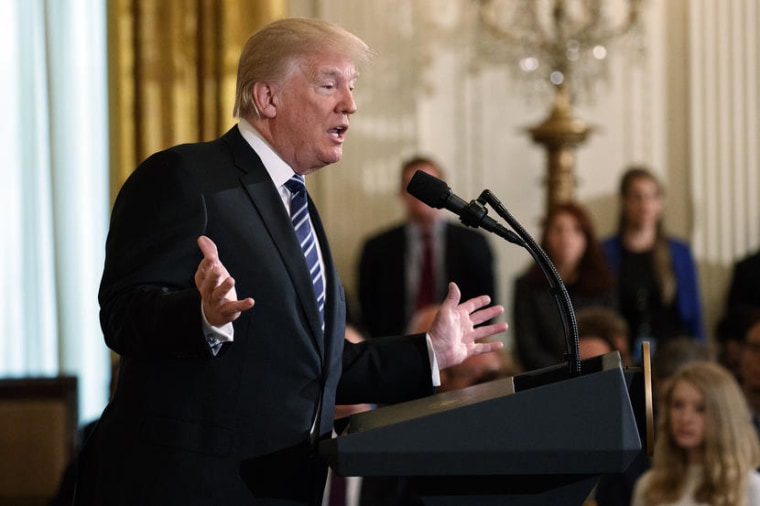Donald Trump aired a couple of ads during the Super Bowl last night, one of which featured a woman named Alice Johnson. The on-screen text noted that Johnson "was sentenced to serve life in prison for a nonviolent drug offense."
The ad then showed Johnson being reunited with loved ones, as the on-screen text added, "Thanks to President Trump, people like Alice are getting a second chance.... People talk about criminal justice reform. President Trump got it done." In case anyone missed the commercial, Trump promoted the ad on Twitter last night -- five times.
On the surface, those watching the ad probably got the impression that Alice Johnson was released from prison thanks to the criminal justice reform legislation Trump signed a couple of years ago. But that's not quite what happened.
In reality, Alice Marie Johnson received clemency from the president because celebrity Kim Kardashian lobbied on her behalf. In fact, the Washington Post reported today that the traditional process for clemency grants has been largely abandoned, replaced by a system in which inmates with connections get favored status, circumventing the Justice Department.
The ad didn't mention Kardashian -- or that all but five of the 24 people who have received clemency from Trump had a line into the White House or currency with his political base, according to a review by The Washington Post. As the administration takes its cues from celebrities, political allies and Fox News, thousands of other offenders who followed Department of Justice rules are waiting, passed over as cases that were brought directly to Trump leaped to the front of line.
For more than 125 years, the Office of the Pardon Attorney in the Justice Department has quietly served as the key adviser on clemency.... Under Trump, the pardon office has become a bureaucratic way station, according to government data and interviews with lawyers, criminal justice advocates, and former pardon and White House officials.
Most of the beneficiaries of clemency under Trump, the article added, "have gone to well-connected offenders who had not filed petitions with the pardon office or did not meet its requirements."
Somehow, these relevant details got left out of the Super Bowl commercial.
Right around the time the ad aired, Vanita Gupta, who lead the Leadership Conference on Civil and Human Rights, and who used to lead the Justice Department's Civil Rights Division, wrote on Twitter, "Trump is running on criminal justice reform? Really? How exactly does that square with the fact that both of his AGs -- Jeff Sessions and Bill Barr -- have undone almost all Obama-era justice and police reforms, targeted progressive DAs, and pressed policies of mass incarceration at every turn?"
It's true, of course, that Trump signed a reform bill into law. It's known as the "First Step Act," and the legislation passed with bipartisan support. Fortunately, the president signed it -- though he's never given any indication that he knows what the proposal entails -- and a few thousand inmates have been freed. It's a policy with a rather narrow scope, but as the name implies, it's a step in the right direction.
For reform advocates, that's the good news. The bad news -- which wasn't part of the Super Bowl commercial, and which will likely be overlooked on the campaign trail -- is that Trump's appointees at the Justice Department aren't exactly fans of the new law, and they've taken steps to limit its application and beneficiaries.
In one especially striking example, Trump celebrated the First Step Act at a White House event last spring, at which point the president hugged a man named Gregory Allen. What attendees didn't know is that Trump's administration fought against Allen's release and wanted to put him back behind bars, even as the former inmate celebrated at the White House. (Justice Department officials backed off after seeing the literal presidential embrace.)
Complicating matters, the president's commitment to the issue is, at best, suspect. It was just six months ago when Politico reported that Trump considered the reform law as a "loser," in large part because "he didn't think his core voters" would care much about the reform effort.
The report came on the heels of the White House budget, which requested no money for implementing the reform law.
A month later, the president's team announced that the Hudson Institute, a conservative think tank, would host the First Step Act's Independent Review Committee. As Mother Jones noted, the panel is responsible for helping develop recidivism risk-assessment tools, which is "a crucial component of the law, as it will be used to determine which federal offenders get access to certain rehabilitative programs and therefore establish how long they remain in prison."
With this in mind, it's worth noting that the Hudson Institute is led in part by critics of criminal justice reform. Indeed, Hudson published a piece in 2016 with a memorable title: "Why Trump Should Oppose 'Criminal-Justice Reform.'"
For Trump to suddenly see this issue to run on is difficult to take seriously, though it's likely his campaign team is counting on voters not knowing the difference.
MORE: Today's Maddowblog
